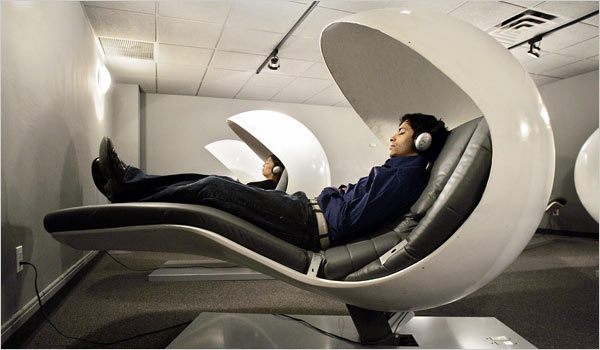Creativity Happens When You Sleep
Sunday, September 28th, 2008In cognitive design we take ordinary objects or events and ask – how do people think and feel when they learn to use or operate this? Or, more importantly, how can we enhance how they think and feel when they use this?
Supporting, improving or even creating cognition (thoughts and feelings) by the way we design products, workflows, HR programs, public health initiatives and really anything, is what cognitive design is all about.
Easy to say, hard to do. One way to do it is by being a student of how minds actually work. Amazingly, most of our management models and product designs make anti brain and mind assumptions. That is, they make faulty and often antagonistic assumptions about how our minds work. They are too complex, boring, assume we value things in a way we don’t, forget our brains our emotional, treat us like computers, ignore the psychology of behavior change or otherwise take more mental energy to use then they give through use.
Fortunately, thanks to practical advances in cognitive science, we have learned more about how the mind works in the last 20 years than we did the previous 500. It is the job of the cognitive designer to put these insights to work and remake our products, services and organizations to fit and enhance the human mind.
Take for example, the recent research into the role of sleep in cognition, especially creativity. Creativity or the cognitive process of coming up with new and interesting ideas is essential to social and economic prosperity. Designing products, services, workspaces, business process, employee programs and so on to support it should be a fundamental concern.
Recent research has shown, that incubation, involving extend periods of unconscious thought, including sleep, is essential for creativity. Aspects of this is covered nicely by Leslie Berlin in her New York Times article, We’ll Fill This Space But First a Nap.
So for the cognitive designer the message is clear. Be sure the design of your client’s innovation process or program goes beyond brainstorming sessions to include several rounds of incubation. Trying to do this too directly and calling for goofing off, napping and over emphasizing ideas that “just come to me” is likely to meet with resistance and failure. However, starting innovation projects and processes early to get plenty of lead time for incubation, conducting intense briefings on aspects of the problem to flood the mind, debriefing people after vacations or other long absences from consciously thinking about the problem, encouraging the use of idea-ries (diaries to capture your ideas) outside of work and having a way to vet ideas “that just came to me” are all simple but essential to supporting how our creativity minds really work.
Skip the brainstorming session and take a nap.
